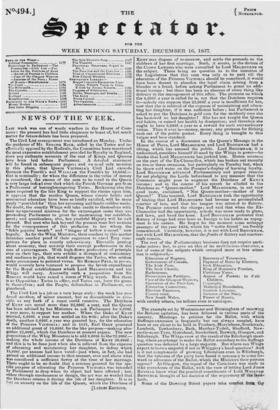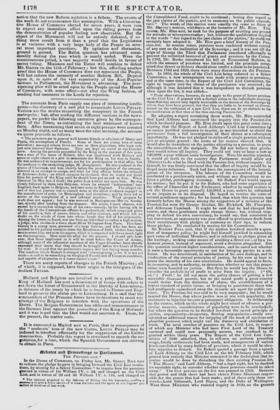The example set by Westminster and Birmingham of renewing the
Reform agitation, has been followed in various parts of the country. Meetings to petition for the Ballot, with which Suffrage-extension is frequently but not always coupled, have been or are about to be held in Finsbury, Marylebone,Southwark, Lambeth, Tewkesbury, Bath, Merthyr-Tydvil, Sheffield, New- castle-upon-Tyne, Gateshead, Sunderland, Berwick, Glasgow, and Edinburgh. The Whigs crow at the result of the Edinburgh meet- ing, where an attempt to make the Ballot secondary to the Suffrage question was defeated by a large majority. But where can Whigs expect to have a majority if not in W higgery's head-quarters? And is it not symptomatic of growing Liberalism even in Edinburgh, that the veterans of the party have found it necessary to come for- ward as advocates of the Ballot, which the Ministers their patrons oppose? At Glasgow, the repeal of the Corn-laws was made to take precedence of the Ballot, with the view of letting Lord JOHN RUSSELL know what the practical constituents of Lord WALL-Au BBNTINCK thought of his doctrine of the supremacy of tbiste0d- lords.
Some of the Downing Street papers take comfort fr9111) tb,, notion that the new Reform agitation is a failure. The events of the week do not countenance this assumption. With a Conserva- tive House of Commons elected for seven years, it were vain to expect any immediate effect upon the ruling powers from the demonstration of popular feeling now observable. But the object of the Movement will not be entirely defeated, if no thing more result from it than a proof that the Legislature is at variance with a very large body of the People on seve- ral most important questions. By agitation and discussion, ground is gained. The Ballot question has advanced consi- derably during the year which is nearly ended. Were the constituencies polled, a vast majority would decide in favour of secret voting. Ministers and the Tories will combine to defeat Mr. GROTE on the 15th of February ; but this, affording another proof that the House of Commons does not represent the People, will but enforce the necessity of another Reform Bill. Depend upon it, in spite of the vast superiority of the Anti-Popular factions in Parliament, the Movement is advancing. The pear- ripening plan will be acted upon by the People quoad the House of Commons, with some effect—not after the Whig fashion, of sending bad measures to the Lords for rejection.



























